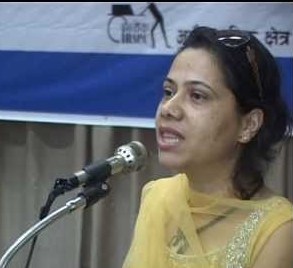
Mandira Sharma is an alumna of the DTP training program in 1995.
She was the first woman from her village in far west Nepal to have passed law school. Since her graduation from University in Kathmandu in 1990 she has worked for grassroots organisations advocating on behalf of prisoners, defending the rights of people in detention, and fighting against torture and ill-treatment and for proper legal representation of all prisoners, both political and non-political.
She began her career as a human rights defender with the renowned Centre for Victims of Torture (CVICT) where she worked till 1991.
She spent three years, from 1996 to 1999, managing a rehabilitation program in women’s prisons for the women and their dependent children. She surveyed all 16 prisons in the eastern regions of Nepal and 10 more in the central region, and was struck by the injustice meted out to prisoners. She saw that torture under police custody was a big problem, affecting the entire system.
With a grant from the British Council Mandira gained a Master of Laws degree in 2000 from the University of Essex where well-known human rights lawyer Kevin Boyle was one of her mentors.
On her return to Nepal from Essex University, Mandira was one of the founders of Advocacy-Forum Nepal a non-governmental organisation that works to promote the rule of law and to uphold international human rights standards in Nepal. At first the organisation saw few successes. Visiting detention centres and talking to prisoners was a challenge in itself. What Advocacy-Forum found all too often, were long-term prisoners whose records were non-existent, few with access to legal representation, and certainly no access to legal aid.
Mandira decided to turn to the UN human rights system hoping to mobilize pressure on the Nepalese authorities. From 2002 she began to bombard the UN and international human rights NGOs (Amnesty International, FIDH, Human Rights Watch) with ten cases per day of documented cases of human rights violations. This resulted in the UN Working Group on Disappearances naming Nepal as the country with the highest number of disappearances.
Advocacy-Forum has grown from strength to strength. Over 130 victims’ groups have been organised. These include both victims from state sponsored violations and those by the Maoists: “the pain is the same in both”, says Mandira. The organisation now has 150 staff and operates in 20 districts. It is beginning to look at incorporating victims of abuse of economic and social rights in its work. Mandira has stepped down from her executive position and is now the Chair. She still lobbies the UN when she visits Geneva a couple of times each year.
Mandira’s work has not all been smooth sailing. She had to fight with the Bar Association which criticized her for going straight to the victims rather than working through the courts and soliciting legal aid for prisoners. More recently Advocacy-Forum was infiltrated by the security services with files deleted from computers and passwords hacked. This was followed by a coordinated media campaign against Mandira herself accusing her of all kinds of misdeeds.
Mandira is complimentary about the DTP training she attended in 1995 where she learnt a great deal about the international human rights framework. She comments that the program would have been even more useful if it had included more details about the UN Special Procedures and on how to access the various human rights mechanisms. Mandira says that the information about how to access the Treaty Bodies and the preparation of “shadow reports” was particularly important in her work on behalf of prisoners.
Mandira Sharma is that rare person, a committed human rights activist with a sense of fun. Despite the many abuses she has witnessed she retains her good humour and looks on the world with an amused and tolerant smile. That tolerance, of course, does not extend to the abusers. She is a role model for all of us.
DTP acknowledges the traditional custodians of the land on which we work, the Bedegal people of the Eora Nation. We recognise their lands were never ceded, and we acknowledge their struggles for recognition and rights and pay our respects to the Elders – past, present – and the youth who are working towards a brighter tomorrow. This continent always was and always will be Aboriginal land.
Aboriginal and Torres Strait Islander peoples should be aware that this website contains images or names of people who have passed away.
DTP acknowledges the traditional custodians of the land on which we work, the Bedegal people of the Eora Nation. We recognise their lands were never ceded, and we acknowledge their struggles for recognition and rights and pay our respects to the Elders – past, present – and the youth who are working towards a brighter tomorrow. This continent always was and always will be Aboriginal land.
Aboriginal and Torres Strait Islander peoples should be aware that this website contains images or names of people who have passed away.
Privacy Policy | Terms of Use | Disclaimer | Policies
© 2022 Diplomacy Training Program | ABN 31 003 925 148 | Web Design by Studio Clvr